- Home
- Richard Matheson
The Gun Fight Page 15
The Gun Fight Read online
Page 15
“Yes, Mister Benton,” he said.
Benton felt an old, almost forgotten beat churning up in his stomach, an almost forgotten tightening of his right arm muscles.
“I’m givin’ it to you straight, Coles,” he said tensely, leaning forward slightly. “If you don’t stop your kid, he’s goin’ to get blown apart.” Julia gasped but Benton kept on. “You hear me, Coles—I said blown apart,” he went on. “I’m not foolin’, so listen to me.”
“I’m listening,” Matthew Coles said.
“This whole damn thing is a mistake,” Benton said, slowly and distinctly. “Beginning to end it’s a mistake. I don’t know Louisa Harper, I never spoke a word to her in my life. That’s it, Coles and that’s all I’m sayin’—and all I’m takin’. Don’t push your kid into this, Coles. Don’t do it. You’ll be sorry.”
Matthew Coles tried to swallow without showing it.
“Is that all?” he said.
“That’s all,” Benton said.
“Mister Coles,” Julia said, her voice pleading, “I beg of you . . .”
Benton said, “Come on, Julia,” his voice low and curt.
Her eyes moved frantically to her husband, then back to Matthew Coles again, her lips moving slightly as though she were going to say something.
“I said come on, Julia,” Benton said, voice a little louder now.
“John, we—”
His strong fingers closed over her arm. “Julia,” he said and the way he said it, it was a command.
“Three o’clock, Mister Benton,” Matthew Coles said.
Benton’s head jerked around and he looked back at Coles, the edge of his jaw whitening in sudden fury.
“That’s enough, Coles,” he warned.
“If you are not in the square by then,” Matthew Coles said, “my son will come out to your ranch and shoot you down like a dog.”
Benton turned a little and his cold voice probed into Matthew Coles’ ears. “You’re mighty free with your son’s life, Coles,” he said. “I wonder if you’d be as free with your own.”
Matthew Coles shuddered but immediately regained his composure. “Get out, Mister Benton,” he ordered. “And be thankful at this moment that you have no gun on you . . .”
Benton almost started back after him. Then, with a twitch of muscles, he turned away. “Just remember, it’s on your conscience,” he said.
Benton led Julia from the shop, his hand tight on her arm. “John,” she kept saying. “John. John . . .”
“That’s enough, Julia,” he said.
“But John, we—”
“I said that’s enough,” he ordered, helping her up onto the buckboard. He walked around it and climbed onto the other side.
“Do you want this fight?” she whispered passionately as he shoved forward the brake and snapped the reins over the mare’s back.
“Sure!” he snapped at her. “Sure, that’s it! That’s all I’ve been doin’ the last two days—lookin’ for a fight!”
“John, I didn’t mean—”
“Then, watch what you say, for God’s sake!”
“John, please. Couldn’t we go see Robby? He’d be alone at home and—”
“No,” he said.
She twisted her shoulders worriedly and bit her lower lip. “Let’s go see the Reverend Bond then,” she said. “He might—”
“No, Julia, no,” he said sternly. “I’m through scraping. I’ve had enough; I’ve had more than enough.”
She sat shivering beside him, staring at his hard-set features as the buckboard rocked and rattled across the square headed for St. Virgil Street, for the edge of town.
In the church steeple, the rust-throated bell tolled and it was one o’clock.
Chapter Twenty-six
“The butter, if you please,” said Agatha Winston and, without a word, her sister passed the plate across the table. “Thank you,” Agatha Winston said, in a tone that held no gratitude. She sliced herself another piece of bread and spread a paper-thin coating of butter on its porous surface. This she cut into four equal parts with two deft strokes of her knife.
Chewing, she eyed her sister, then her niece, neither of whom were eating.
“I thought you were hungry,” she said to Louisa.
Her niece looked up a moment and Agatha Winston saw the nervous swallowing in her throat.
“I . . . guess I’m not,” Louisa said.
“You’d better eat something or you’ll get sick,” said her aunt. She sliced off a thick piece of bread and dropped it on Louisa’s plate. “Put cheese on it,” she said. “It’s good for you.”
“I’m really not . . . not hungry, Aunt Agatha.”
“Eat it,” said her aunt and, after a moment, Louisa picked up her knife obediently.
“Why are you shaking so?” her aunt asked and Louisa started in her chair.
“I’m . . . cold,” she said, lowering her eyes. She felt the probing gaze of her aunt on her as she buttered the bread with nervous movements. She thought she knew what her aunt was thinking—cold; shaking; that time of the month; something not spoken of; preferably, not even thought of.
At any other time, knowing or thinking that Aunt Agatha was thinking that would have flushed Louisa’s cheek with shamed embarrassment but today it didn’t seem important. There was a clock ticking away the time in the hall and there was only one thing important—to get out of the house and find someone who could stop the fight. It was strange but there was no question in her mind about telling her aunt even when she believed that it would end the fight. She had to tell someone else.
After a few token bites, she put down the bread.
“May I be excused?” she asked, wondering what time it was.
“You haven’t eaten a thing,” said her aunt.
“Perhaps she’s . . . not well,” Louisa’s mother suggested timidly.
“She won’t be well if she doesn’t eat something.”
Outside, in the hall, the pendulum was swinging; one fifteen.
“I don’t feel well,” Louisa followed her mother’s lead. “May I be excused?” A plan was suddenly forming in her mind; the two of them at the kitchen table, the front door unguarded.
“You’d better go to your room,” said Aunt Agatha.
“Can’t I go for a—” Louisa cut off her impulsive words with a shudder.
“For what?” Aunt Agatha challenged.
“N-nothing, Aunt Agath—”
“I hope you have no plans for leaving the house, young miss,” Agatha Winston said suspiciously. “You know very well you can’t go out and you know why.”
Louisa swallowed, feeling the pulsebeat throbbing in her wrists. She shouldn’t have mentioned going out.
“All r-ight,” she faltered. “I’ll go up to my room.”
She pushed back her chair and stood, trying to keep her face composed, trying not to think of the consequences of running from the house against her aunt’s orders. “Excuse me,” she murmured, her hands cold and trembling as she moved around the table and started for the door.
“I think you’d better lie down for a while,” Aunt Agatha told her.
“Yes, Aunt Agatha, I will,” she said, then shuddered as she realized she was lying. I don’t care—she told herself as she pushed through the swinging door and moved along the hall rug toward the door—it doesn’t matter anymore what she thinks.
“Where do you think you’re going?”
At the sound of her aunt’s demanding voice, Louisa’s hand jerked off the door handle and twitched down to her side.
She stood there, white-faced, as her aunt stalked up to her.
“Where were you going, Louisa?”
“N-no place.”
“Don’t lie to me, Louisa!”
In the kitchen doorway, Louisa noticed her mother appear, her face confused and helpless.
“I was just g-going out on the porch,” she told her aunt
“Why?”
“I . . . just wanted some air; it
’s so s-stuffy in my room.”
Agatha Winston looked at her doubtfully, her thin lips pinched together.
“I hope you’re telling me the truth, Louisa,” she said. “I hope so.”
“I am, I am.”
Agatha Winston gestured toward the staircase. “Go up to your room,” she said tersely. “We’ll discuss this later.”
“Yes, Aunt Ag—”
“Agatha,” Mrs. Harper said then and Agatha Winston turned. For a moment, the two women looked out at each other and a questioning expression flickered across Elizabeth Harper’s face. Agatha seemed to guess what her sister was thinking for she turned back to Louisa quickly.
“Your room,” she said.
When Louisa had reached the top of the staircase, Agatha Winston moved to where her sister stood.
“What’s the matter with you?” she challenged. “Do you want her to know? Isn’t there enough to worry about already?”
“But it doesn’t seem fair to—”
“Fair!” Agatha Winston burst out angrily. “Would it be fair to make her sick with worry? Would it?”
Elizabeth Harper looked at her sister and was lost in hopeless confusion. “I don’t know,” she murmured. “Perhaps . . . you’re right. I . . . don’t know. If only my dear—”
“I do know,” snapped Agatha Winston and went back to the stairs to listen for the closing of the upstairs door.
Up in the hallway, Louisa stood leaning against the wall watching the clock pendulum move endlessly from side to side. And there seemed to be a pendulum in her chest too that swung and struck against her heart and her ribs. Back and forth hitting her heart—her ribs—heart—ribs—heart—time passing inexorably.
Her hands shook and there was a great sick churning in her stomach.
Suddenly she sobbed. “Robby!” His name fell like a shattered thing from her lips.
In an hour and a half . . .
Chapter Twenty-seven
She’d been silent all the way back to the ranch; silent as he unhitched the mare but left his own horse saddled and tied up in front of the house. Silent as they went into the house and found the kitchen table covered with the remains of the dinner the boys had made for themselves; silent as John went into the bedroom, silent as she stood in the middle of the small kitchen, listening to the sound of his footsteps, the sound of the clock ticking, her eyes fastened to the doorway he would return through. All this time, silent.
But when he came back in, buckling on his gunbelt, she felt herself twitch suddenly and words came.
“John, you can’t,” she said, “you just can’t.”
He stopped walking and looked at her, his face strained with unvoiced tensions. For a moment his hands were motionless on the belt buckle. Then they finished up and dropped to his sides and a heavy breath of air expanded his chest before slowly emptying from it.
“I have to,” was all he said.
“But why?”
His lips pressed together a little as he stood there looking at her. Then he turned and glanced at the clock. It was almost two.
“I think you know why,” he said.
He went over to the stove and opened one of the covers. Dropping in some kindling and crumpled newspaper, he lit them with a sulfur match. Julia stood there, without a word, staring at the pistol butt bobbing slightly on his left hip as he stirred up the flames and put the coffee pot over them.
Suddenly she moved to him and her hands clutched at his arms.
“Just don’t go,” she said impulsively. “Just refuse to fight him.”
He tried to look patient with her but it didn’t work. He shook his head once, very slowly.
“But why?” she asked again, a tremor in her voice.
“Julia, you know why. You heard what Matt Coles said. If I don’t come into town, Robby’ll come out here.” His head shook again. “I won’t have that, Julia,” he said.
“But he won’t come out.”
“You know different,” he said calmly. “You know what’s behind him, pushin’.”
“But he wouldn’t shoot you down in cold blood!”
“He would if his father made him,” John said, a little more loudly now. “No, it’s no good, Julia, it’s just no good. I’m not goin’ to set here and wait for Robby to come out lookin’ for me.”
“But John, he wouldn’t shoot you, he’s not that way.”
Benton blew out a tired breath and turned back to the stove to move the coffee pot restlessly over the fire.
“Whether he shot me or not,” he said, “it’d be the same. I’d be a laughin’stock.”
“Laughingstock?” she said, uncomprehendingly. “I don’t—”
“I could never ride into town again without bein’ laughed at.”
“Well who cares about that?” Julia argued. “Isn’t it more important that—”
“I care,” Benton said, turning abruptly, his face hard and determined. “I didn’t start this fight, Julia; you know I didn’t start it. But I’m not lettin’ anybody push me into a corner and make a fool of—”
“You’d rather kill, is that it?” she said sharply.
“If that’s what you think . . .” Benton didn’t finish up but turned slowly to the stove again.
Julia felt herself trembling with nervous anger.
“We’ll move then,” she said desperately. “We’ll go away.”
“What?” He looked at her incredulously. “After all the work we’ve put into this place? Just move? What kind of an idea is that?”
“I just don’t want you to fight that boy!” she flared up at him.
His face stiffened as if he were about to yell back at her but he repressed it instantly.
“Listen, Julia,” he said, “I’ve done everything you ever asked of me. I finally left the Rangers because you couldn’t take worryin’ anymore, it wasn’t just the Grahams. I never wore a gun in the town, I only wore it on the ranch. I didn’t even join that posse though I should have. But don’t ask me to back out of this.”
“You said you’d never put on a gun against anyone as long as you lived,” she said in a hollow voice.
He looked at her as if he couldn’t believe what he’d heard.
“Julia, what do you want me to do—forget I’m a man? Creep away from this fight? I didn’t start the damn thing, I didn’t have a thing to do with it. But, for God’s sake, don’t expect me to run away from it when—”
“You promised, John.” It was all she could say.
“I said I wouldn’t put on a gun against anybody! I never said I wouldn’t defend myself! Can’t you see there’s a difference?”
“This isn’t just anybody!” she said vehemently. “This is a boy who hasn’t got a chance against you!”
“I make it that way?” he asked. “Did I tell him to challenge me?”
“It doesn’t matter who challenged who! You can’t fight him, that’s all!”
“Julia, I’m going to fight him.”
The words seemed to come from the very depth of her fear and her fury; they fell from her lips slowly and clearly.
“John Benton,” she said, “if you draw your gun against that boy, it’ll be murder. Murder!”
He looked at her colorless face a long time before turning away to the stove and saying, “That’s right. It will be.”
She stood there shivering, watching his steady hand pour coffee into the cup. He took the cup and walked out of the room and she listened to the sound of his boots moving through the house, then the sound of him sinking down on their bed.
Her eyes suddenly closed and she flung a hand across them as a wracking sob broke in her throat. Stumbling through a haze of tears, she moved to the table and sank down, her head falling forward on her arms, her body lurching with great, hopeless sobs.
She was conscious of the clock striking two.
Then, outside, there was a sound of turning wheels and thudding hooves. She straightened up with a gasp, a look of shocked surprise on her face. Hasti
ly, she reached into her dress pocket and drew out a handkerchief. She dabbed at her cheeks and eyes as she stood up and hurried to the door.
It’s them, the terrifying thought came suddenly. They said three but it was only a trick and they were coming at two to catch John by surprise.
Then, in the doorway, she stopped and stared out blankly at the small woman getting out of a rig with hurried, nervous movements.
Julia stood rooted there as the woman came up to her.
“Your husband hasn’t gone yet, has he?” the woman asked quickly.
“No,” Julia said, not understanding. “No, he—”
“Thank God,” Jane Coles said fervently, then stood there awkwardly, clutching the shawl to herself.
“Come in,” Julia said, feeling her heart start to throb in slow, heavy beats. What was Mrs. Coles doing there? For a second, Julia had the wild hope that the fight was canceled and Mrs. Coles was the one they’d sent with the message. But that didn’t make sense and she knew it.
As she stepped aside to let the small woman enter, John appeared in the other doorway, tensed as though he were expecting the same thing Julia had expected.
When he saw Robby’s mother, the tenseness left his face and was replaced by a look of startled surprise. He didn’t say anything as Mrs. Coles came over to him.
“Mister Benton,” she said.
He nodded once. “Missus Coles,” he replied, looking down at the small frailty of her.
“I—” She said. “I . . . wanted to—to—”
“Yes?” he said.
There was silence for a terrible moment, a silence that seemed, suddenly, as if it would be permanent, holding them all fast in it.
But then Mrs. Coles’ faint voice spoke. “I . . . came about . . . about the fight,” she said, nervously.
Benton tightened a little but still he didn’t understand. He looked down at her with confused eyes. “I . . .” he started and then waited.
“My boy is . . .” Mrs. Coles started and then suddenly it all came rushing out. “Oh, Mister Benton, don’t hurt him! Don’t hurt my boy!”
Benton jerked back the upper part of his body as if someone had struck him across the face; his expression was one of stunned shock.

 Earthbound
Earthbound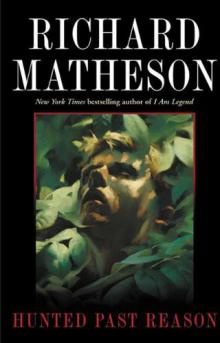 Hunted Past Reason
Hunted Past Reason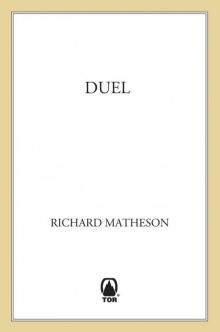 Duel: Terror Stories
Duel: Terror Stories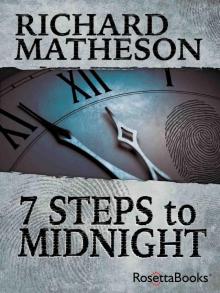 7 Steps to Midnight
7 Steps to Midnight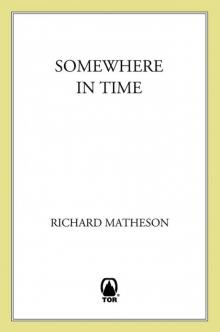 Somewhere in Time
Somewhere in Time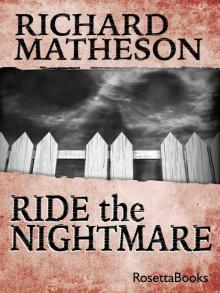 Ride the Nightmare
Ride the Nightmare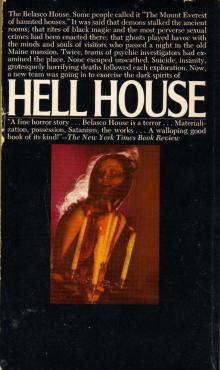 Hell House
Hell House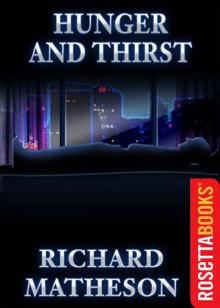 Hunger and Thirst
Hunger and Thirst Lyrics
Lyrics Other Kingdoms
Other Kingdoms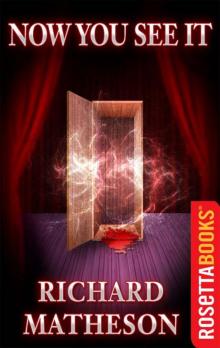 Now You See It . . .
Now You See It . . .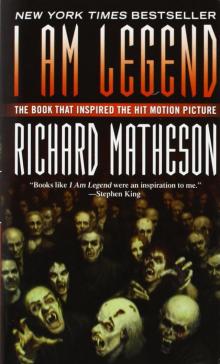 I Am Legend
I Am Legend The Box: Uncanny Stories
The Box: Uncanny Stories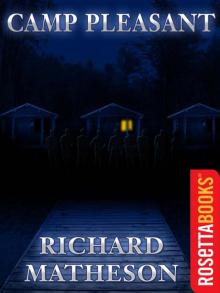 Camp Pleasant
Camp Pleasant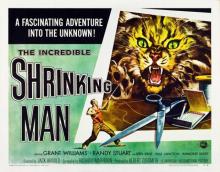 The Incredible Shrinking Man
The Incredible Shrinking Man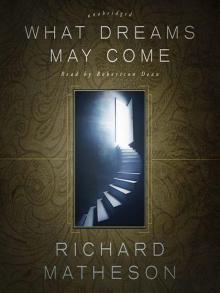 What Dreams May Come
What Dreams May Come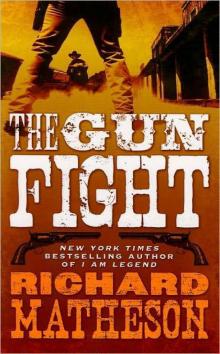 The Gun Fight
The Gun Fight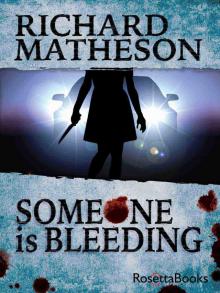 Someone Is Bleeding
Someone Is Bleeding Mediums Rare
Mediums Rare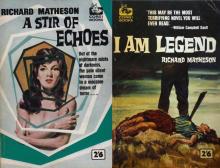 A Stir of Echoes
A Stir of Echoes Backteria and Other Improbable Tales
Backteria and Other Improbable Tales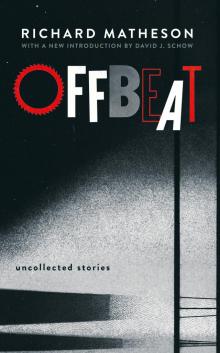 Offbeat: Uncollected Stories
Offbeat: Uncollected Stories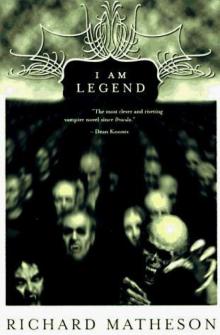 I Am Legend and Other Stories
I Am Legend and Other Stories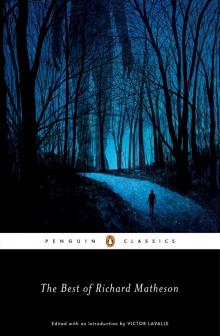 The Best of Richard Matheson
The Best of Richard Matheson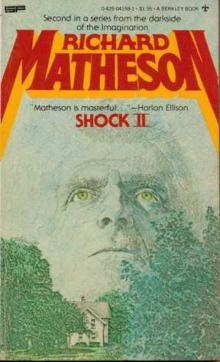 Shock II
Shock II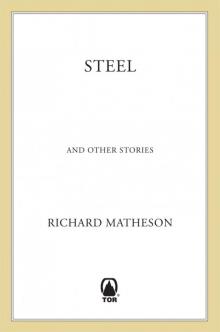 Steel: And Other Stories
Steel: And Other Stories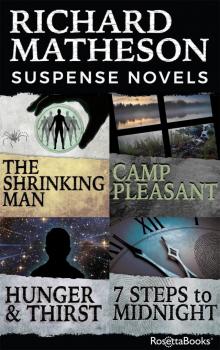 Richard Matheson Suspense Novels
Richard Matheson Suspense Novels The Link
The Link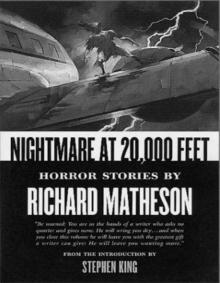 Nightmare At 20,000 Feet
Nightmare At 20,000 Feet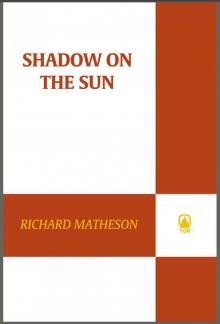 Shadow on the Sun
Shadow on the Sun![Steel and other stories [SSC] Read online](http://i1.bookreadfree.com/i/03/21/steel_and_other_stories_ssc_preview.jpg) Steel and other stories [SSC]
Steel and other stories [SSC] Created By
Created By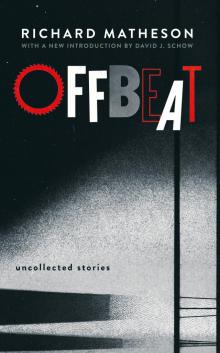 Offbeat
Offbeat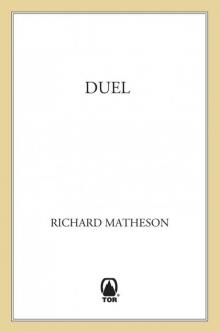 Duel
Duel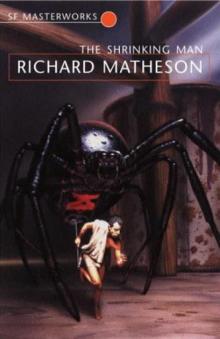 The Shrinking Man
The Shrinking Man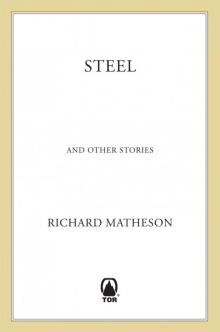 Steel
Steel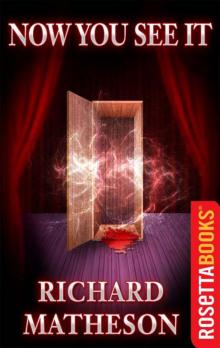 Now You See It
Now You See It